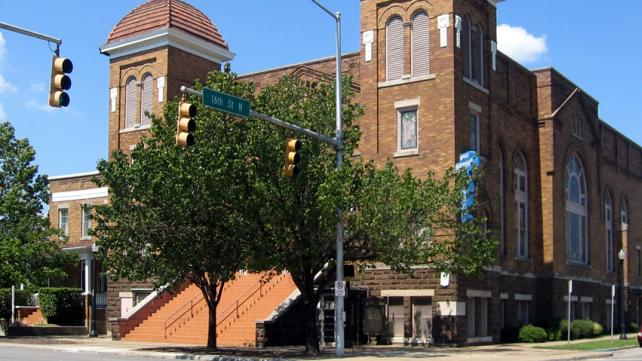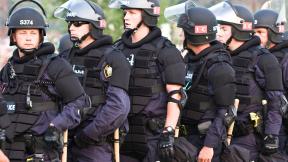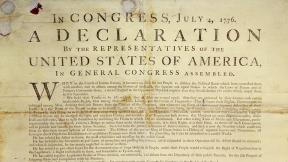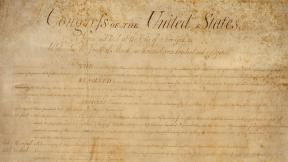
Educating yourself and your family about the US civil rights movement can start with books and family discussions. But it shouldn't end there. You can learn much more about this critical struggle for equal rights by taking a cross-country civil rights tour.
Summer is a great time to do this, as the kids are out of school and looking for some amusement after spending the first few weeks of vacation vegetating in front of the computer or TV. While relaxing is great, the danger is, their brains will turn to mush by the end of August. A tour combines leisure and education.
At a time when the civil rights of all are being eroded, with Muslims being the targets of abuses, it is extremely important for Americans of all backgrounds to understand the importance of civil rights. We need to know and remember that our rights to free speech, freedom from discrimination, and much more were not served to us on the proverbial silver platter. They were fought for by Americans of all backgrounds, who often paid with their lives so that we could benefit today.
Most of the sites you'll find are in the southern, eastern and northeastern states. These include museums and institutes, but also churches.
Below are some suggestions of places to visit on your tour.
Alabama
This is THE state to visit if you're serious about learning more about the US civil rights movement. Alabama is where the Montgomery Bus Boycott, started by an elderly African-American woman named Rosa Parks, launched the civil rights movement in 1955.
One important site is the Birmingham Civil Rights Institute. While it features different galleries with various exhibits, its largest one is the Movement Gallery. This focuses on events between 1955 to 1965, which is when civil rights leader Martin Luther King Jr. was most active in Alabama. It includes a replica of a burned Greyhound bus that, in 1961 carried "Freedom Riders". These were a group of 13 African-Americans and Caucasian-Americans, most of them college students, who set out from Washington, D.C. to New Orleans, Louisiana, to test a new federal law against racial segregation. They never made it to New Orleans. In Anniston, Alabama, the bus was fire bombed. Moreover, as they struggled to get out of the bus, they were beaten.
You'll also find a replica of the Birmingham Jail cell where Martin Luther King Jr. was imprisoned and where he wrote the famous "Letter from the Birmingham Jail” in April 1963. The letter was a response to white clergymen who blamed King for precipitating violence in a confrontation between African-Americans and the city’s Public Safety Commissioner and municipal authorities. King Jr.’s letter was written variously on toilet paper, the margins of newspapers and any paper available to him.
Interestingly, the bars in this imitation jail are the ones from the actual cell.
A second important site is the Sixteenth Street Baptist Church in Birmingham.
This church is where four young African-American girls were killed after the Ku Klux Klan bombed the site in September 1963. The incident brought world attention and condemnation of racial violence.
The church is at the intersection of 16th Street and 6th Avenue. Tours are given 10 am to 4 pm, Tuesday through Friday and by appointment only on Saturdays. Groups should call 205-251-9402 to make arrangements. They currently do not have a website.
The Rosa Parks Museum
is also an important site to check out. Named in honor of the woman who launched the movement (described as the "Mother Of the Civil Rights Movement" on the museum's website ), it includes a replica of the infamous public bus on which Parks sat that started the movement. She was ordered to sit at the back of the bus, along with the rest of the African-Americans. She refused, thus launching the Montgomery Bus Boycott in 1955, the starting point of the civil rights movement.
Finally, the National Voting Rights Museum in Selma is a site dedicated to those who died for the right of African-Americans to vote. Photo and video exhibits document the struggle in this museum that was established by survivors of the March 7, 1965 "Bloody Sunday" massacre. That was when 600 demonstrators in Selma marched in protest of the denial of voting rights to African-Americans.
Tennessee
Tennessee may be more known for its Smoky Mountains, but the state is also home to the country's National Civil Rights Museum.
The National Civil Rights Museum is located at the site of the Lorraine Motel in downtown Memphis, Tennessee. This is where Martin Luther King Jr. was assassinated in April 1968, outside room 306. It was, at one point, one of the few hotels open to African-Americans. The Museum chronicles the history of the civil rights movement.
Check out their website for more information at http://www.civilrightsmuseum.org/
Washington, DC
Deep in the heart of the nation's capital, you'll find a fascinating civil rights tour. The "Civil War to Civil Rights" Heritage Trail presents little-known sites that link the history of the city to the history of the nation. The trail focuses on Washington's experiences during the Civil War as well as the continuing challenge to realize the American dream of equal rights for all its citizens.
One site worth seeing on this tour: hotel where Dr. Martin Luther King, Jr., put the finishing touches on his historic "I Have a Dream" speech.
Mississippi
The city of Jackson is not only the site of the first Muslim Museum in America it's also home of the first permanent civil rights exhibit in the US.
The Old Capitol State Historical Museum, built in 1833, houses exhibits related to slavery and the Civil War, and is home to the first permanent civil rights exhibit in the United States, where you can watch major events of the civil rights movement on news film footage.
Illinois
The Du Sable Museum of African-American history in Chicago is an excellent resource on learning more about the civil rights movement as well as the history of African-Americans in this country. Among the artifacts and documents you'll find civil rights memorabilia. It is one of the first African-American museums in the country.
ADDED BONUS: If you visit before November 7, 2003, you can check out their exhibit Runaway Slave - Drapetomania: The Quest For Freedom, which includes "The Life of Omar ibn Said,". This is the earliest known handwritten slave narrative written in 1831 by an enslaved Muslim.
Georgia
The Ralph Mark Gilbert Civil Rights Museum in Savannah is named in honor of late Dr. Ralph Mark Gilbert, the "father of Savannah's modern day Civil Rights Movement" and a courageous former president of the National Association for the Advancement of Colored People (NAACP)
The museum chronicles the civil rights struggle of Georgia's oldest African- American community from slavery to the present. Exhibits include a lunch counter where "sit ins" occurred, segregation exhibits, and a fiber optic map of 87 significant civil rights sites or events.
California
While African-Americans played the leading role in the fight for civil rights in America, Japanese-Americans also had to pay the price for civil liberties, especially during World War II. That was when 110,000 Japanese-Americans were herded into internment camps for the crime of having Japanese ancestry. Japan was America’s enemy during WWII.
The Japanese American National Museum in Los Angeles, chronicles this tragedy, but also the triumphs of Japanese-Americans since then.
Native Americans
A special word needs to be said about Native Americans, the original inhabitants of America. This community has suffered horrific human rights abuses at the hands of European colonizers who first arrived on this continent centuries ago. Genocide is probably a euphemism for the massacres of Native Americans, the attempt at destroying their languages and cultures, as well as efforts to Europeanize them.
Their human and civil rights continue to be violated. Visiting places like the The Museum of the Southeast American Indian in Pembroke, North Carolina and the National Museum of the American Indian in Washington, DC will not only help expose you and your kids to Native American culture, but also the systematic attempts to take away their human and civil rights before the term “civil rights” was probably even coined in the American context.
Across the US
For a list of sites in your state, check out the website We Shall Overcome: Historic Places Of The Civil Rights Movement.
Photo Attribution: John Morse - http://commons.wikimedia.org/wiki/File:16th_Street_Baptist_Church.JPG








Comments
Tour &Travel
It is very useful blog for visiting us any where Please Keep uo your thought between us. Also visit TravelRahi.
http://travelrahi.com/
Location
These are great suggestions. I also host tours of the Civil Rights South through my company Freedom Lifted. Please check it out: www.freedomlifted.com
Location
Add new comment